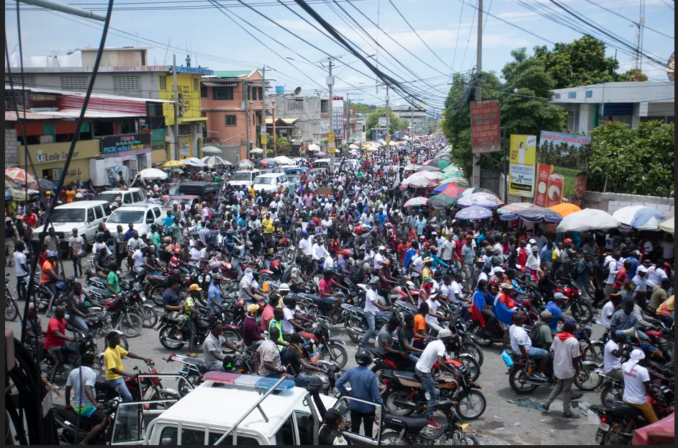Haiti: Masses take to the streets June 26
At the call of Lavalas, a political party led by former President Jean Bertrand Aristide — who was deposed by U.S.-backed coups twice — thousands of Haitians took to the streets of Port-au-Prince June 26.

Tens of thousands of Haitians came out June 26 in Port-au-Prince.
According to interviews in an AP video, besides demanding Aristide having a leading role in the transition to a reestablished functioning government, marchers were denouncing the high price of food and fuel; the increasing violence; the rampant, flagrant kidnapping of people, from women market vendors and schoolkids to doctors and lawyers; and the absence of any sort of public services.
The march began at Resistance Square near the Port-au-Prince airport and headed toward Aristide’s private house. through neighborhoods where he had served as a parish priest. The marchers want Aristide involved in resolving the current anarchy and political chaos in Haiti.
The march was so strong and large that some Haitian news sites, such as the Haitian Times and AlterPresse, wrote that only hundreds marched, in order to undermine its impact. The Al-Jazeera and the Kreyol AP videos showed thousands marching. The Lavalas executive committee released a tweet June 26 thanking the Haitian people for their response.
A post from Martinique’s television station points out that this march took place a few days after acting Prime Minister Ariel Henry visited Aristide.
Besides Henry’s visit, Helen La Lime visited Aristide June 8. La Lime’s current job is leading the United Nations Office in Haiti and representing the U.N. Secretary General. She was given her U.N. job after being a high-ranking U.S. State Department official. She also leads the “Core Group,” a collection of ambassadors and international organizations that ensure Washington’s domination of Haiti.
Haitians in crisis
The website of the Famine Early Warning Systems Network, run by the U.S. Agency for International Development, shows how much hunger, otherwise known as “food insecurity,” exists in Haiti. About half the country is “stressed,” and half is “in crisis.” Put another way, at least half of all Haitians regularly don’t get enough to eat and have trouble finding potable water.
The Department of Homeland Security has granted over 56,000 undocumented Haitians living in the United States under Temporary Protective Status, which allows them to work and live in the U.S., but at the same time, it has deported by air over 24,000 Haitians who didn’t meet the requirements for TPS.
Some 6,000 Haitians who have fled by boat from the northern Haitian coast have been intercepted by the U.S. Coast Guard and returned. (Miami Herald, July 1) Five or six refugee boats have managed to reach southern Florida or the Florida Keys.
The U.S. is obviously worried that Haiti could collapse, releasing a flood of refugees that would destabilize at least the Caribbean and perhaps much of Latin America. Some U.S. officials, wanting to stem the tide of struggle and prevent it from spreading to other Caribbean nations, may be betting that Aristide can calm the coming storm. But the protest on June 26 shows he can still call tens of thousands of militants out.
David Oxygèn, the leader of Moleghaf, a progressive and revolutionary Haitian organization, told Haïti-Liberté May 18, “The solution today must come from the popular masses, who must wake up and rise up to carry their popular, progressive political demands, to carry out a truly autonomous struggle to get the country out of the hole in which it finds itself.”

